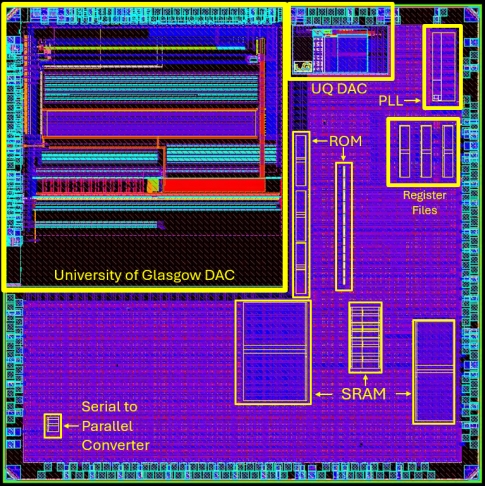SureCore 成功流片低温 IP demonstrator
Sheffield, UK - May 8, 2024 -- SureCore, the ultra-low power embedded memory specialist, has announced the successful tape out of the next key part of the Innovate UK (IUK) - funded project “Development of CryoCMOS to Enable the Next Generation of Scalable Quantum Computers”. This is a chip that will validate the cryogenic SPICE models and IP developed in the project that will be used for control and measurement ASICs to be housed within the cryostat along with the qubits. Moving the control electronics from outside the cryostat to within it is needed to reduce latency and cabling but means that the electronics has to operate at unprecedented low temperatures of down to 4 Kelvin, which is the purpose of the project.
Paul Wells, sureCore’s CEO, said “This is the culmination of great teamwork by the consortium members who have all made invaluable contributions to this control chip design. Their cryogenic IPs have been successfully integrated by a very capable, physical design team at Agile Analog.”
Barry Paterson, Agile Analog’s CEO, added, “We are delighted to be involved in this project and gain the experience and knowledge of silicon performance at these extremely challenging cryogenic temperatures. This experience will enable future IP developments in the Quantum space.”
The plot shows the various IP blocks. A DAC from the University of Glasgow, a DAC from Universal Quantum and sureCore’s PLL, ROM block, Register File Block and SRAM Block. The remaining purple area is mainly control logic.
Wells added, “This is a great example of how InnovateUK bring teams of experts together to create innovation that would not be possible otherwise. This project will enable the UK to be seen as a centre of excellence not only for Quantum Computing but also for cryogenic transistor modelling as well as cryogenic IP and chip design. By working as a focused, expert team, the project has been able to successfully meet critical milestones and deadlines in a timely and efficient manner. This would not have been possible without the support of InnovateUK.”

Project Background
sureCore has exploited its state-of-the-art, ultra-low power memory design skills to create embedded Static Random Access Memory (SRAM), an essential building block for any digital sub-system, that is capable of operating from 77K (-196°C) down to the near absolute zero temperatures needed by Quantum Computers (QCs). In addition, both standard cell and IO cell libraries have been re-characterised for operation at cryogenic temperatures thereby enabling an industry standard RTL to GDSII physical design flow to be readily adopted.
A key barrier to QC scaling is being able to collocate ever increasingly complex control electronics close to the qubits that must be housed at cryogenic temperatures in a cryostat. In doing so, it is essential that the control chip power consumption is kept as low as possible to ensure that excess heat is kept to a minimum so it does not cause additional thermal load on the cryostat. Here, sureCore’s low power design expertise proved pivotal.
Current QC designs have the control electronics located outside the cryostat as modern semiconductor technology is only qualified to work down to -40°C. As the temperature is reduced close to absolute zero the operating characteristics of the transistors change markedly. Measuring, understanding and modelling this behavioural change over the past months showcases the potential to build interface chips that can control and monitor qubits at cryogenic temperatures.
At the moment, expensive bulky cabling connects room temperature control electronics to the qubits housed in the cryostat. Enabling QC developers to be able to exploit the fabless design paradigm and create their own custom cryogenic control SoCs, which can be housed with the qubits inside the cryostat, is a game-changer that will rapidly enable QC scaling. Immediate benefits include cost, size and, most importantly, latency reduction. The next step will be characterising the demonstrator chip at cryo temperatures to further refine and validate the models to help improve the performance.”
The IUK-funded consortium is a complete ecosystem of companies with the expertise and core competencies required to develop cryo-tolerant semiconductor IP. The aim of the project is to develop and prove a suite of foundation IP that can be licenced to designers allowing them to create their own Cryo-CMOS SoC solutions. By doing so their competitive edge in the Quantum Computing space will be dramatically accelerated.
sureCore www.sure-core.com
Related Semiconductor IP
- eUSB2V2.0 Controller + PHY IP
- I/O Library with LVDS in SkyWater 90nm
- 50G PON LDPC Encoder/Decoder
- UALink Controller
- RISC-V Debug & Trace IP
Related News
- 由sureCore牵头的财团获得Innovate UK 650万英镑的资金,开发低温CMOS IP来加速量子计算可扩展性
- Perceptia 正式发布基于 GlobalFoundries 22FDX 的 10-bit 极低温 (Cryogenic)数/模(DAC)、模/数(ADC)转换器 IP
- sureCore 的 28 纳米 FDSOI 内存编译器浓重上市
- Menta针对台积电28nm工艺实现嵌入sureCore低功耗SRAM IP